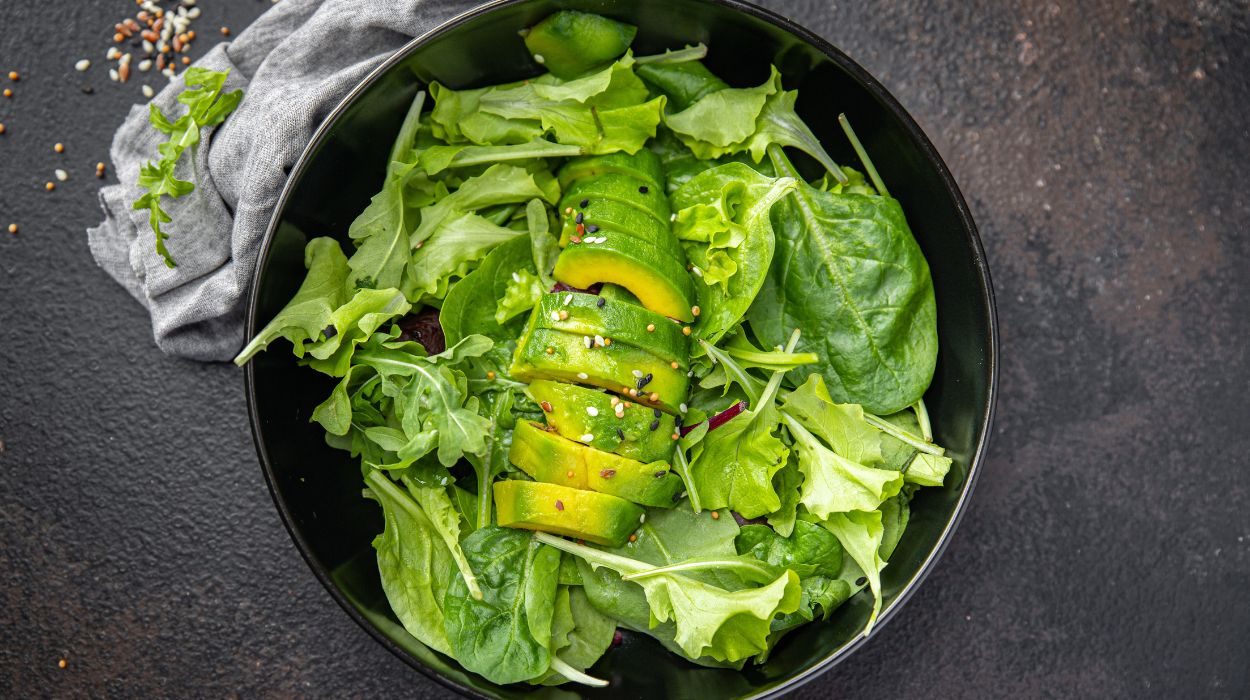 Evidence Based
Evidence Based
Evidence Based
This article is objectively based on relevant scientific literature, written by experienced medical writers, and fact-checked by a team of degreed medical experts.
Our team of registered dietitian nutritionists and licensed medical professionals seek to remain objective and unbiased while preserving the integrity of any scientific debate.
The articles contain evidence-based references from approved scientific sites. The numbers* in parentheses (*1,2,3) will take you to clickable links to our reputable sources.
Vegan Keto Diet 2024: Benefits, Foods List & Precautions

If you’ve tried to reduce weight or eat healthier, you’ve probably heard of the keto diet. The high-fat, low-carbohydrate keto diet has been suggested as a means to lose weight and maybe reverse diabetes and high blood pressure. The keto diet, which includes meat and cheese, is incompatible with veganism.
Veganism and ketosis are compatible. Vegan keto diets may even be healthier than ketogenic diets. Avocados, nuts, seeds, and plant-based oils can be used to create a sustainable and nutritionally balanced vegan keto meal plan.
Vegan keto diets can help you lose weight and improve your health while being ethical and environmentally friendly. A licensed dietician or healthcare expert can help you satisfy your nutritional needs on a vegan keto diet.
Vegan Keto Diet
A ketogenic diet[1] generally consists of high-fat foods and might include cheese, milk, fatty fish, nuts, and seeds. It might feel impossible to be vegan and follow a ketogenic diet. However, there are plenty of plant-based healthy fats that fit within both vegan and ketogenic diets.
Health benefits of following a vegan keto diet include weight loss and improved cardiovascular health. If you choose to follow a vegan keto diet, make sure that you add as much variety to your menu as you can and speak to your doctor about any health concerns you have.
What Is A Vegan Keto Diet?
The vegan keto diet is a plant-based eating plan in which 70-75% of calorie intake is derived from fat, 20-25% from protein, and a mere 5-10% from carbohydrates. This dietary approach exclusively relies on plant-based sources to meet its rigorous demands for both diets. By following a low-carb vegan diet, starchy vegetables and the majority of fruits are eliminated, making room for nutrient-rich alternatives such as olive oil, nuts and seeds, avocado, and full-fat coconut milk. Although these strict low-carbohydrate diets are effective for shedding pounds, sustaining them over extended periods can prove challenging.
Benefits Of Following A Vegan Keto Diet
Vegan keto diets aren’t just trendy, they actually have many potential health benefits.
Weight Loss

Extremely low-carb diets have been shown[2] to help people achieve large amounts of weight loss. For people who have struggled with their weight for years, following a vegan keto diet might help them get the jumpstart they need to live a healthier lifestyle.
A vegan ketogenic diet for weight loss can be maintained for about a year with the guidance of a trained physician.
Manage Appetite
One of the many reasons that the keto diet works so well for weight loss is that it can severely decrease your appetite. One of the most difficult challenges that people face while trying to lose weight is fighting feelings of hunger all day long.
Due to high-fat and low-carb intake, ketogenic diets reduce and even eliminate feelings of hunger. Being in ketosis changes the hunger hormones in the body to make a person feel full, even if they have eaten very little.
Control Blood Sugar
Plant-based ketogenic diets can help people with type 2 diabetes control their blood sugar levels. In fact, doctors often recommend that people should immediately cut back on their blood sugar medication when they commit to a ketogenic diet.
Starting a keto diet while taking blood sugar medications may cause your blood sugar to drop too low. Speak with your physician before making any adjustments to your medication or making major dietary changes.
Epilepsy Treatment
Interestingly, the high-fat ketogenic diet was originally created to help children with epilepsy. Additionally, recent studies,[3] including experiments with controlled groups, have focused on the benefits of the ketogenic diet for patients with neurological conditions. These studies have shown that the ketogenic diet is an effective treatment for epilepsy and holds promising therapeutic potential for other diseases like Alzheimer’s, Parkinson’s, multiple sclerosis, and migraines.
While more research is needed to fully understand the mechanisms behind these benefits and to determine the optimal application of the ketogenic diet for each condition, the current findings offer hope for those affected by these neurological disorders. The ketogenic diet presents a potential alternative or complementary approach to traditional treatments, providing patients with additional options to manage their symptoms and improve their quality of life.
Vegan Keto Food List

Finding a keto diet foods list is a good place to start when planning meals for a vegan ketogenic diet. Once you have a rough idea of ketogenic foods, eliminate animal products and add in more plant-based foods that fit within a vegan diet.
Foods you can include in your vegan ketogenic diet include:
- Coconut oil
- Coconut cream
- Pumpkin seeds
- Nutritional yeast
- Avocado or avocado oil
- Vegan cheese
- Almond butter
- Hemp seeds
- Non-starchy vegetables
- Leafy greens
- Olive oil
- Sesame oil
- Tofu
- Tempeh
- Seitan
- Plant-based milk
- Vegan protein powder
You can get creative with your recipes and make things like vegan cauliflower mac and cheese or coconut almond chia pudding. Using tools like the best keto app or another food tracker can help you stay on track when you travel or go out to eat with friends. Being able to quickly check food ingredients on your phone or find a vegan and keto-friendly restaurant really can make or break your diet.
Foods To Avoid On A Vegan Keto Diet
Besides avoiding obviously off-diet foods like high-carb foods or animal foods, there are a few sneaky foods that you should avoid while on a vegetarian keto diet.
Artificial Sweeteners
Artificial sweeteners like Sweet n’ Low and Stevia are vegan and can be eaten on a ketogenic diet. Many people who are trying to lose weight or cut their sugar intake turn to artificial sweeteners to help them achieve their goals.
Unfortunately, research shows[4] that some artificial sweeteners are actually worse for you than table sugar.
Pre-Packaged Foods
As the popularity of vegan diets grows, manufacturers have responded by introducing more plant-based, long-lasting pre-packaged foods marketed as vegan “treats.” While some of these low-carb vegan options are beneficial for your health, it is crucial to carefully examine the ingredient labels.
It is a common misconception that all vegan products are automatically healthy. Even vegan cheese can contain added sugars or artificial ingredients that may not align with your dietary goals.
In addition to artificial additives, determining whether a pre-made meal will truly maintain your body in a state of ketosis can be challenging. Ketogenic diets rely on utilizing fats as fuel, and unintentionally consuming a high-carb item can disrupt ketosis, making the diet less effective.
Generally, scrutinizing labels will help you identify any hidden chemicals or carbohydrates. However, if you genuinely wish to adhere to a vegan and ketogenic diet, your best option is to prepare all your meals at home. By doing so, you have full control over the ingredients and can ensure they align with your dietary needs and preferences.
Vegan Keto Diet: Precautions
While there are many health benefits of following a vegan ketogenic diet, there are also some risks. Following either a vegan diet or a ketogenic diet may lead to nutrient deficiencies or disordered eating. Vegan keto dieters are left with very few food options and they may miss out on essential vitamins and minerals.
Lacking Nutrients
Keto diets lack healthy foods like starchy vegetables, fruits, and whole grains. Vegan diets exclude all animal products including some traditional ketogenic staples like fatty fish and cheese.
The vegan keto diet restricts several food groups, which can increase the risk of nutrient deficiencies. Since the diet limits carbohydrate-rich foods like grains, legumes, and certain fruits and vegetables, it can be challenging to obtain adequate amounts of fiber, vitamins (such as vitamin C and vitamin B12), minerals (like iron and calcium), and antioxidants. Prolonged deficiencies in these essential nutrients can lead to various health issues.
Kidney Stones
Unfortunately, following such a high-fat diet can increase the risk of kidney stones. This is true even if you only consume healthy fats like coconut milk and avocado oils.
Keto Flu
Some people experience what is known as the “keto flu” about two to seven days after starting their diet. Symptoms of keto flu include Headache, fatigue, difficulty sleeping, irritability, nausea, difficulty sleeping, and constipation. Recent studies[5] recommended drinking plenty of water, easing into ketosis, and including plenty of vegetables in your diet to avoid these uncomfortable symptoms.
Gastrointestinal Problems
The low-fiber nature of the vegan keto diet can lead to digestive problems. Insufficient fiber intake may result in constipation, irregular bowel movements, and an imbalanced gut microbiome. Fiber plays a crucial role in promoting digestive health, maintaining bowel regularity, and supporting a diverse and healthy gut microbiota.
Increased Risk Of Ketosis-Related Complications
Achieving and maintaining a state of ketosis, where the body relies on ketones for fuel instead of carbohydrates, can have potential drawbacks. Ketosis can cause symptoms such as fatigue, nausea, brain fog, and bad breath. In extreme cases, it may lead to a condition called ketoacidosis, which is characterized by excessively high levels of ketones and can be life-threatening.
Adverse Effects On Cholesterol Levels
High intake of saturated fats, often found in plant-based sources like coconut oil and palm oil, can negatively impact cholesterol levels. It may lead to an increase in LDL (bad) cholesterol and potentially raise the risk of cardiovascular diseases if consumed excessively or without balancing it with other healthy fats.
Final Thought
In conclusion, while the vegan keto diet offers potential health benefits such as weight loss and improved cardiovascular health, there are also several precautions to consider. Nutritional deficiencies can occur due to the restricted food groups, and careful attention must be paid to ensure adequate intake of essential nutrients.
The low-fiber nature of the diet can lead to gastrointestinal issues, and achieving and maintaining ketosis can result in symptoms like fatigue and bad breath, as well as a risk of ketoacidosis in extreme cases.
Additionally, the high intake of saturated fats in some plant-based sources may negatively affect cholesterol levels and increase the risk of cardiovascular diseases. It is important to consult with a healthcare professional or registered dietitian to ensure proper nutrient balance and address any concerns before embarking on a vegan keto diet.
+ 5 sources
Health Canal avoids using tertiary references. We have strict sourcing guidelines and rely on peer-reviewed studies, academic researches from medical associations and institutions. To ensure the accuracy of articles in Health Canal, you can read more about the editorial process here
- McGaugh, E. and Barthel, B. (2022). A Review of Ketogenic Diet and Lifestyle. Missouri medicine, [online] 119(1), pp.84–88. Available at: https://www.ncbi.nlm.nih.gov/pmc/articles/PMC9312449/.
- Gentil, P. (2014). Ketogenic Diet for Obesity: Friend or Foe? [online] 11(2), pp.2092–2107. doi:https://doi.org/10.3390/ijerph110202092.
- Dyńka, D., Katarzyna Kowalcze and Agnieszka Paziewska (2022). The Role of Ketogenic Diet in the Treatment of Neurological Diseases. [online] 14(23), pp.5003–5003. doi:https://doi.org/10.3390/nu14235003.
- Arun Kumar Sharma, S. Amarnath, M Thulasimani and Ramaswamy, S. (2016). Artificial sweeteners as a sugar substitute: Are they really safe? Indian Journal of Pharmacology, [online] 48(3), pp.237–237. doi:https://doi.org/10.4103/0253-7613.182888.
- Bostock, S., Kirkby, K.C., Taylor, B. and Hawrelak, J. (2020). Consumer Reports of ‘Keto Flu’ Associated With the Ketogenic Diet. Frontiers in Nutrition, [online] 7. doi:https://doi.org/10.3389/fnut.2020.00020.



